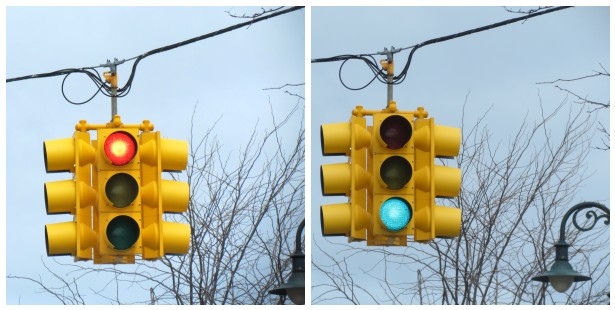Slides
What is a State Machine
- A system with a number of defined 'states'.
- Which can only be in one state at a time.
- With defined rules to 'transition' between states.
State Machine Example: Traffic Light

- How many states? What are their names?
- Can it be in more than one state at a time?
- What are the rules for transitioning between states?
image by katerha
State Transition Diagram: Traffic Light
[G] -> [Y] -> [R]
^ |
\___________/
Q: What if there was a "left turn ok" green light as well?
State Machine Example: Simon

- How many states? What are their names?
- Can it be in more than one state at a time?
- What are the rules for transitioning between states?
State Transition Diagram: Simon
[G] <-> [Y]
^ \ / ^
| X |
| / \ |
v v
[R] <-> [B]
State Machine Example: GUI Button
[TODO: picture(s) of MacOS button]
States:
- Enabled
- Disabled
- Pressed
- Active
Transitions:
- [enabled] -> mouseDown -> [pressed]
- "when the mouse is pressed, render the button as being pressed"
- [pressed] -> mouseUp -> [active]
- "when the button is 'down', and the user releases the mouse button, enter the 'active' state"
- [pressed] -> mouseExit -> [enabled]
- "when the button is 'down', and the pointer leaves the button, re-render the button as up (not pressed)"
- [enabled] -> mouseUp -> []
- "when the button is 'up', and the user releases the mouse button, do nothing"
- ... and so on
We may also need a state transition action: "when the button enters the 'active' state, send a 'click' event and then enter the 'Enabled' state"
Why use a state machine?
- Clarity
- Predicability
- Fail-fast debugging
- Many bugs are due to the system receiving unexpected input, or input that is inappropriate at the moment
- (it's like rai-ee-ain on your wedding day)
- an "illegal state transition" error means something unexpected just happened
- so you may need to add a new transition or state (or validation routine, or error handler) to handle it when it happens again
- Without a state machine, the system may remain in an invalid state for some time, making it harder to debug once something eventually does break
State of the State
The term "state" has several overlapping meanings.
- in general, "state" means any data
- especially in OO, e.g. "state and behavior" means "instance variables and instance methods"
- in particular, "state" means "there is a clear state transition diagram at work here"
The term "state machine" has several technical variants as well.
- "Infinite State Machine" e.g. Turing Machine
- "Finite State Machine" or "Finite State Automaton" e.g. Conway's Game of Life
How to implement a state machine?
There's more than one way to do it.
Easiest way is with something like this:
let states = {
"green": {canChangeTo: ["yellow"]},
"yellow": {canChangeTo: ["red"]},
"red": {canChangeTo: ["green"]}
}
let currentState = "green";
function enterState(newState) {
let validTransitions = states[currentState].canChangeTo;
if (validTransitions.includes(newState)) {
currentState = newState;
} else {
throw "Invalid state transition attempted - from " + currentState + " to " + newState;
}
}